Abstract
We consider the problem of selecting alternatives from a set of feasible alternatives over which each agent is endowed with a strict preference. We show that there is one and only one rule that satisfies anonymity, neutrality, efficiency, tops-only, and reinforcement. The rule is known as plurality rule, which selects the alternative(s) most preferred by the largest number of agents.
Similar content being viewed by others
References
Barberá S., Sonnenschein H., Zhou L. (1991) Voting by committees. Econometrica 59, 595–609
Borda, J.C.: Mémoire sur les élections au scrutin. Mémoires de l’Académie Royale des Sciences. English trans. by A. de Grazia. Isis 44 (1781)
Campbell D.E., Kelly J.S. (2002) A leximin characterization of strategy-proof and non-resolute social choice procedures. Econ Theory 20, 809–829
Ching S. (1996) A simple characterization of plurality rule. J. Econ. Theory 71, 298–302
Fishburn P.C. (1973) The theory of social choice. Princeton, Princeton University Press
Fine B., Fine K. (1974a) Social choice and individual ranking I. Rev. Econ. Stud. 41, 303–322
Fine B., Fine K. (1974b) Social choice and individual ranking II. Rev. Econ. Stud. 41, 459–475
Ju B.-G. (2003) A characterization of strategy-proof voting rules for separable weak orderings. Soc Choice Welfare 21, 469–499
Ju B.-G. (2005a) An efficiency characterization of plurality social choice on simple preference domains. Econ Theory 26, 115–128
Ju B.-G. (2005b) A characterization of plurality-like rules based on nonmanipulability, restricted efficiency, and anonymity. Int. J. Game Theory 33, 335–354
Koray S. (2000) Self-selective social choice functions verify Arrow and Gibbard-Satterthwaite Theorems. Econometrica 68, 981–995
Masso J., Neme A. (2004) A maximal domain of preferences for strategy-proof, efficient, and simple rules in the division problem. Soc Choice Welfare 23, 187–206
Mihara H.R. (2000) Coalitionally strategy-proof function depend only on the most-preferred alternatives. Soc Choice Welfare 17, 393–402
Moulin H. (1980) On strategy-proofness and single-peakedness. Public Choice 35, 435–455
Moulin H. (1984) Generalized Condorcet-winners for single-peaked and single-plateau preferences. Soc. Choice Welfare 1, 127–147
Myerson R.B. (1995) Axiomatic derivation of scoring rules without the ordering assumption. Soc. Choice Welfare 12, 59–74
Richelson J.T. (1978) A characterization result for the plurality rule. J. Econ. Theory 19, 548–550
Saari D.G. (2000a) Mathematical structure of voting paradoxes I: Pairwise votes. Econ. Theory 15, 1–53
Saari D.G. (2000b) Mathematical structure of voting paradoxes II: Positional voting. Econ. Theory 15, 55–102
Smith J.H. (1973) Aggregation of preferences with variable electorate. Econometrica 41, 1027–1041
Thomson W. (2000) Consistent allocation rules. University of Rochester, Mimeo
Yeh C.-H. (2006) Reduction-consistency in collective choice problems. J. Math. Econ. 42, 637–652
Young H.P. (1974) An axiomatization of Borda’s rule. J. Econ. Theory 9, 43–52
Young H.P. (1975) Social choice scoring functions. SIAM J. Appl. Math. 28, 824–838
Author information
Authors and Affiliations
Corresponding author
Additional information
I would like to thank William Thomson for helpful suggestions and discussions. I am grateful to Biung-Ghi Ju, Hyungjun Kim, and Yan-An Hwang for detailed comments. I am also indebted to the Editor and an anonymous referee for valuable suggestions. As usual, I am responsible for any remaining deficiency.
Rights and permissions
About this article
Cite this article
Yeh, CH. An efficiency characterization of plurality rule in collective choice problems. Economic Theory 34, 575–583 (2008). https://doi.org/10.1007/s00199-006-0193-4
Received:
Revised:
Published:
Issue Date:
DOI: https://doi.org/10.1007/s00199-006-0193-4




